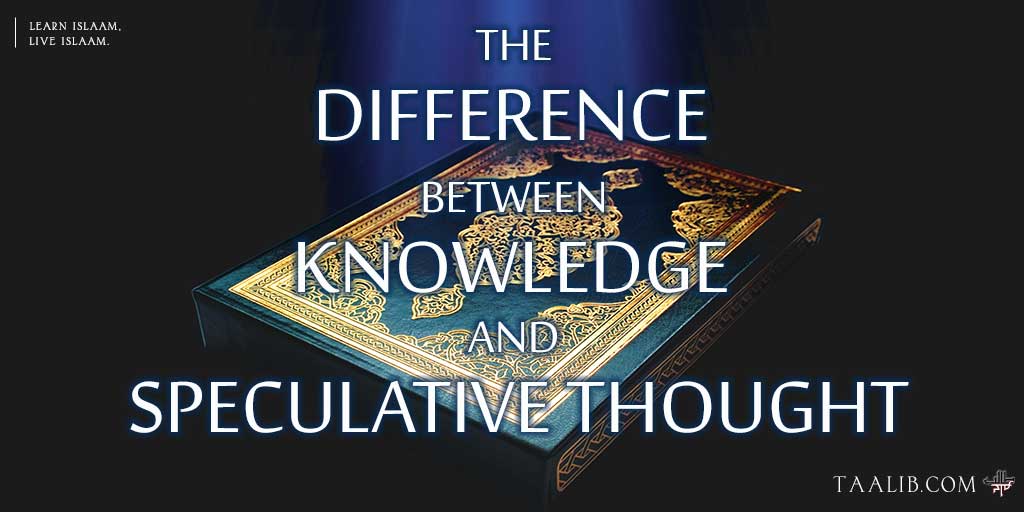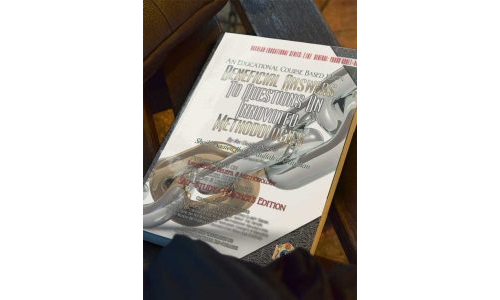The Difference between Knowledge and Speculative Thought
Source: Sheikh Saaleh ibn Abdul-Azeez Aal-Sheikh
True Knowledge Has Tremendous Benefits
Knowledge has tremendous benefits, the first of which is the rectification of one’s worship. And “Islaamic thinkers”, as they have said, desire through their efforts to lead the people to a state of piety or to place them, as they say, upon a correct Islaamic image or model; but this is not a guaranteed result. Rather this goal of theirs, in most cases, is not attained by them. However, knowledge does indeed lead to the rectification of worship and towards piety.
Because knowledge which is taken according to its principals, evidences, and fundamentals, upon the methodology of the first generations of Islaam, does guide to the rectification of one’s worship, the establishing of firm and correct beliefs, and the correction of one’s behavior and perspective in one’s various dealings and interactions with the people, as well as in all newly occurring circumstances or situations.
Speculative Thought Changes Constantly
But as for speculative thought and opinion, it changes constantly. Due to this, when the people do not have clear knowledge to direct and guide them, then they frequently discuss and deliberate various matters at length such that new concepts begin to appear in their thoughts and speech. Ten or twenty different ideas or concepts are introduced or brought forth at the same time, with each individual legitimizing and supporting his view. Such that numerous differences and divisions then appear at a single gathering, with perhaps four people holding four separate and distinct views.
Likewise, one may hold a view and yet change it later taking a differing view, because speculative thought and opinion stands as the fundamental source or origin. However, when we place knowledge as the fundamental reference, then the differing will be reduced and limited; it will be restrained such that the people will eventually reach the correct way of worship and the proper understanding.
From the greatest benefits or results of knowledge is that knowledge unifies while speculative thought causes separation. This fact was indicated in the statement of the former head religious authority of the country of Saudi Arabia, the exemplary scholar Sheikh Muhammad ibn Ibraheem, may Allaah have mercy upon him. In his time, he noticed the people drifting toward various cultural ideas and abandoning knowledge, and this was even before these different parties, groups, and organizations were known in this land- but close to the end of his life. So he made the following statement to some of the prominent individuals and some of the students of knowledge:
“I advise the people with knowledge, as knowledge unifies and speculative thought and unrestricted cultural ideas separate you and cause disunity.” This is something true, which we have witnessed. Knowledge is that which unifies while cultural ideas and concepts separate and lead to disunity.
If You Differ With Someone In An Issue
Consider that if you differ with someone in an issue, and the fundamental source of reference is knowledge, then everyone initially accepts his own understanding saying: “By Allaah, what is clear is that the ruling in this is such and such” while another says, “No. It is clear that the ruling in this is such and such.” However after this, they refer back to a scholar, eventually coming to unanimously agree on the correctness of his statement and judgment. Thus they are united after being previously divided in their views over this issue. And differing in relation to certain matters of understanding the religion is easy matter. So how will the situation be if they differ in a serious issue- an issue related to the general welfare of the Muslim Ummah, or to the domain of calling to Allaah, or to the rectification of the matters through command and prohibition related to the struggle in the path of Allaah, or issues similar to these? In such a situation- differing, if it occurs without referring back to the people of knowledge, leads to evil and separation….
An Important Distinction
….Secondly, from the important distinctions is that knowledge has principles by which matters are assessed and weighed, and speculative thought lacks such principles by which questions and issues can be assessed. If an individual speaks regarding a knowledge-related issue, then we are able to judge whether his statement is acceptable or not acceptable. Are his statements strong or weak? But as for speculative thought, what then are its fundamental guidelines? What are its principles? If someone wishes to assess the statement of an intellectual thinker, meaning one of the general people, with what standard can they assess it? As he is not able to refer it to accepted authorities to make a judgment or assessment.
Knowledge Has Such Recognized Authorities
However knowledge has such recognized authorities. So in contrast, speculative thought is not established upon clear guidelines and principles nor does it have established authorities by which concepts are evaluated, except by submitting itself to true knowledge. True knowledge acts as the judge and authority over speculative thought. Additionally knowledge has as one of its principal characteristics, that it is worthy of being commended and praised and that its people are worthy of commendation and praise. But as for speculative thought, it is simply various ideas and opinions, and the principal characteristic of opinion is that it is condemned and censured. Indeed, this is a tremendous difference and fundamental distinction between these two matters.
______________________________________________________________________











![30 Days of Guidance: Signposts Towards Rectification & Repentance - [Book 3] Preview](https://taalib.com/wp-content/uploads/wpdm-cache/1book-whereisyourlife-1024-500x300.jpg)
